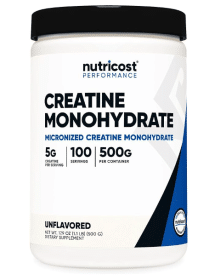Cavaliere says no sound research supports creatine to have adverse effects on hair loss.
Jeff Cavaliere is a renowned exercise scientist and fitness expert with decades of experience promoting health, nutrition, and physical wellness. As a former strength and conditioning coach and head physical therapist for the New York Mets, his expertise spans bodybuilding, fitness, and nutrition. He has also authored multiple books on these topics, solidifying his reputation as a trusted authority in the industry.
Cavaliere founded Athlean-X, a company known for its science-backed approach to fitness programs and supplements. The brand is dedicated to helping individuals look like elite athletes and move and perform like them.
Recently, Cavaliere shared valuable insights about creatine, one of the most widely researched and popular supplements in fitness and bodybuilding. In his analysis, he delves into the benefits, potential side effects, and science behind this powerhouse supplement.
What Is Creatine?
Creatine is a natural compound produced by the liver, pancreas, and kidneys. It helps to supply energy to the muscles, especially during intense bursts of activity (1). Foods such as red meat, seafood, and fish also contain creatine. Creatine helps build muscle mass and can help improve performance during resistance training. This characteristic of creatine has been well-researched, and studies show it is safe to use. However, some questions abound about the possible side effects of creatine.
Jeff Cavaliere Explains Creatine
According to Jeff Cavaliere, when you work out, you need energy; to do this, you need molecules called adenosine triphosphate (ATP). ATP has three phosphate groups attached to it, but when we work out, one of those phosphate groups is removed, leaving us with ADP, which has two phosphates.
When you supplement with creatine, you’re turbocharging the body’s ability to regenerate that ATP, allowing you to keep working. So when creatine enters the muscle cells, it bonds with the phosphate, enabling you to continue to work hard. Jeff Cavaliere says creatine supplementation also allows you to increase muscle size.
“Anytime a molecule enters a cell, it often brings with it H2O or water. That actually causes the cell to swell and as it swells, you not only get a hypertrophy benefit from the cell swelling itself, but it actually causes immediate weight gain and long term, you’re getting a hydrated muscle cell.”
— Jeff Cavaliere
Cavaliere explains that creatine is safe to use and regarded as a GRAS (generally recognized as safe) supplement by the FDA. A lot of evidence shows it’s safe to use in the long term. “As a matter of fact, 21% of males in high school right now are taking creatine and 3% of females,” Cavaliere stated.
Hair Loss
According to Cavaliere, there’s no evidence of a relationship between creatine and hair loss. He thinks this myth stems from people’s confusion about testosterone, steroids, and creatine. Cavaliere thinks one could cause hair loss by worrying about the effect of creatine on one’s hair rather than taking the supplement.
“Just because we think that elevating DHT will cause a loss of hair in that person, if you don’t see it happening, it may not be related,” he explained. “As a matter of fact, just training hard like those rugby players did can actually raise those levels of DHT. This is one of those areas where correlation does not equal causation. As a matter of fact, it is causing more fear.”
Kidney Damage
Cavaliere says the myth that creatine causes kidney damage is similar to the myth that high-protein diets cause your kidneys to fail. He says no evidence supports that. However, you might have heard that because of something that sounds like creatine but is actually different, which is called creatinine.
Creatinine is a wasteful by-product of creatine’s breakdown. Excess creatinine in the blood usually indicates that your kidneys might not be functioning properly. However, when taking creatine, these elevated levels are normal and will eventually be eliminated by the kidneys.
Creatine & Dehydration
According to Cavaliere, the cramping and dehydration is most likely not directly related to creatine intake. Creatine pulls water into the cells, which might give the impression that you’ll get dehydrated. However, studies we see show the opposite and point out that you get protective effects from taking creatine. “Dehydration and cramping is not one of your worries,” Cavaliere said.
How to Take Creatine
There are many factors to consider when taking creatine. It depends on your size, type of creatine and your weight. It also depends on whether you’re in a loading phase. According to Cavaliere, to meet a rough estimate of 5 g dosage daily, below are some factors to consider:
- The body makes 1.5 g of creatine daily itself.
- 6 oz of chicken contains about 0.45 g of creatine.
- 6 oz of steak contains about 0.7 g of creatine.
- 16 oz of herring contains about 3.8 g of creatine.
These sources of creatine can be expensive, making it the best and most economical to use creatine supplements. According to research, the 5 g dose is the readily accepted creatine intake amount. However, the type of creatine you take matters, and this boils down to the two major creatine types: creatine monohydrate and creatine hydrochloride. The difference between these two is that the creatine molecule is bound to something different.
Creatine hydrochloride is bound to hydrochloric acid, while creatine monohydrate is bound to water molecules. Ironically, monohydrate bound to a water molecule isn’t very easy to dissolve in water, so you must take higher doses. On the other hand, creatine hydrochloride dissolves more efficiently, and the body absorbs it readily, allowing you to use smaller doses.
According to Jeff Cavaliere, you can take creatine supplements at any point in the day if you continue to take them consistently to get the benefits. This helps you keep those creatine storage levels high.
Creatine: Muscle Gain & Strength Gain
Jeff Cavaliere explains that creatine use leads to weight gain, which is water weight and some muscle. During the first week of creatine use, two to three pounds of weight gain will occur. “That’s coming from that intracellular water that’s actually a good thing long term. Because over the course of four to twelve weeks, that more hydrated muscle, a better, more optimal environment for muscle growth, is going to contribute additional muscle gains to that.”
When taking creatine, the strength gains are impressive. Cavaliere says strength increases from 5 to 15% for four to twelve weeks. However, this is also dependent on resistance training and compound lifts.
Creatine for Older Adults
Cavalier says that taking creatine is the best idea for older adults. Some advantages of creatine include improving overall brain health and increasing memory retention (2). He says it also decreases the incidence of progressive neurological diseases like multiple sclerosis (MS), amyotrophic lateral sclerosis (ALS), or Parkinson’s disease. It can also prevent muscle mass loss in older adults so they can keep more muscle as they age. He further explained, “This might be one of the best things you could possibly take if you’re older, not just maybe I should. I think it’s looking like it might be a necessity for everybody, athlete or not.”
Nutricost Creatine Monohydrate
If you’re looking for a quality creatine supplement, we suggest Nutricost’s creatine monohydrate. This supplement comes from a reputed brand in the supplement industry and offers quality natural ingredients at an affordable price.
Get all of the benefits of micronized creatine without breaking the bank and activate muscle building quickly.
Follow Generation Iron on Instagram, Facebook, and Twitter for more exercise and nutrition science!
References
- Kreider, R. B., & Stout, J. R. (2021). Creatine in Health and Disease. Nutrients, 13(2), 447. https://doi.org/10.3390/nu13020447
- Forbes, S. C., Cordingley, D. M., Cornish, S. M., Gualano, B., Roschel, H., Ostojic, S. M., Rawson, E. S., Roy, B. D., Prokopidis, K., Giannos, P., & Candow, D. G. (2022). Effects of Creatine Supplementation on Brain Function and Health. Nutrients, 14(5), 921. https://doi.org/10.3390/nu14050921









